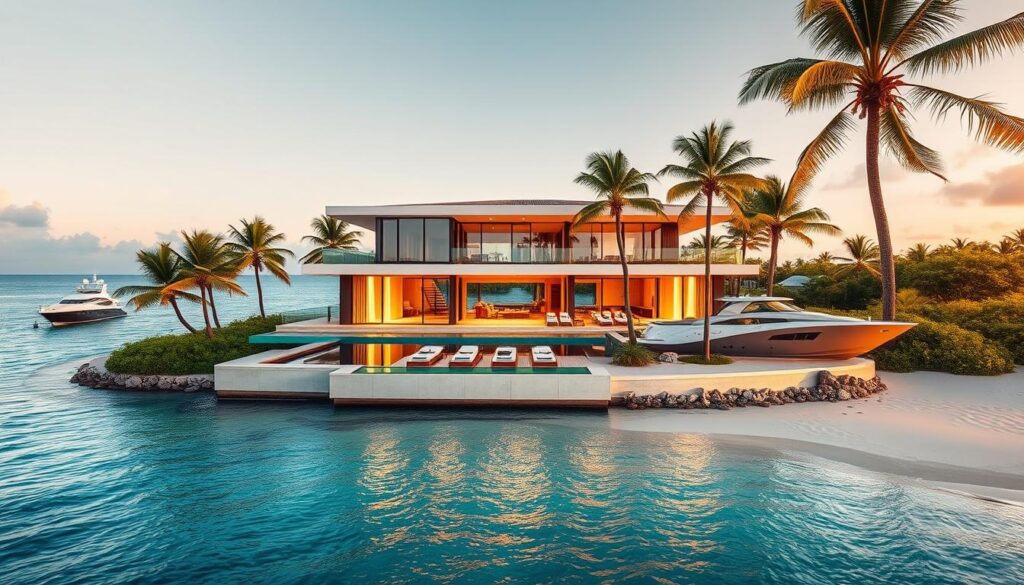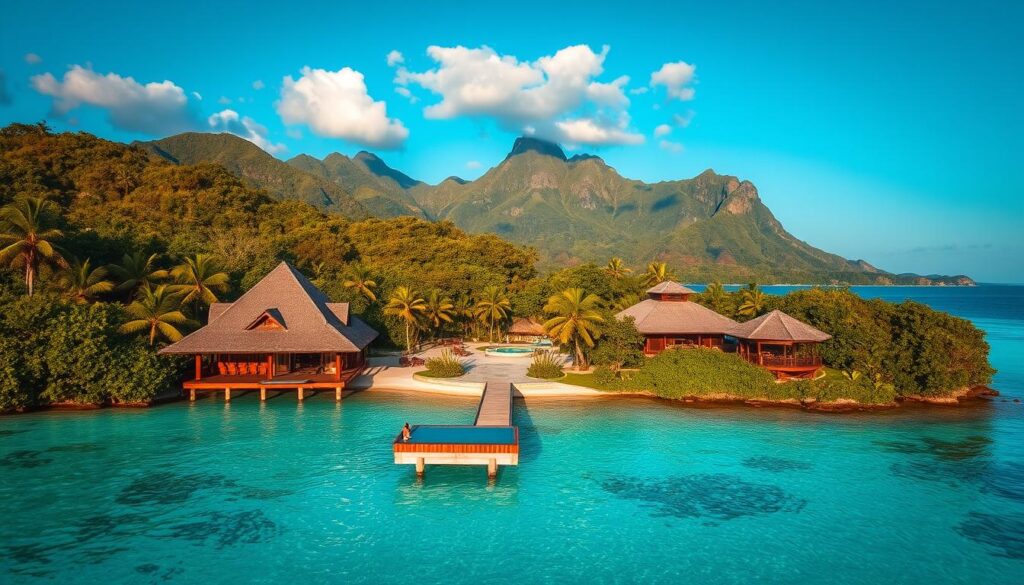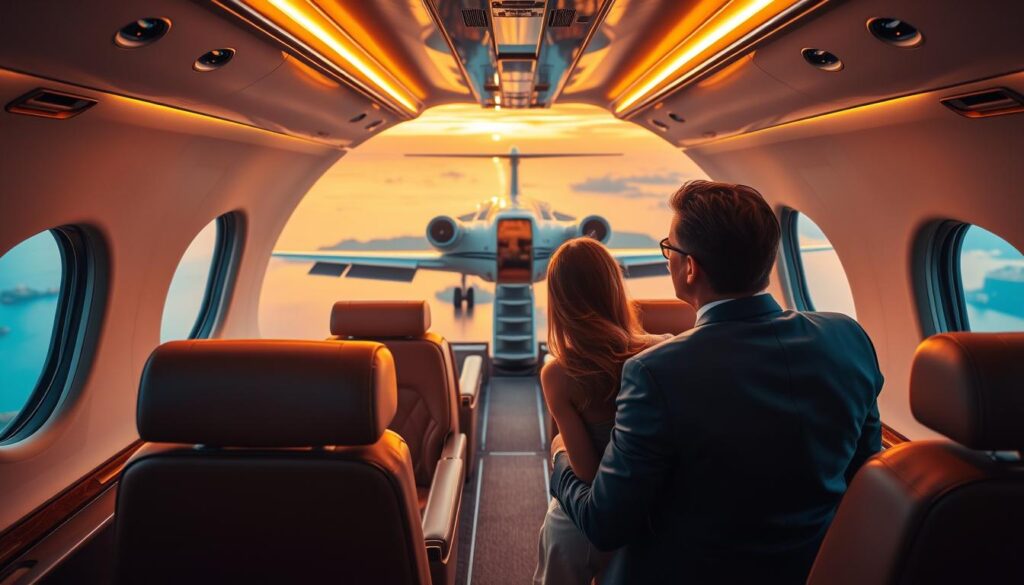The luxury tourism and hospitality sector is growing fast. Affluent travelers are looking for unique travel experiences. They want exclusive itineraries and new offerings.
A recent survey of 5,061 travelers shows interesting trends. 35% of them have a net worth of $100,000 to $1 million. They prefer destinations like Antarctica and private retreats that offer both comfort and adventure.
After the pandemic, travelers now want secluded places that feel like home. 65% of them are looking for sunny coastal escapes. Asia’s luxury-hotel pipeline is huge, with 41% of global development happening there.
Over 10% of bookings are for solo travel. This segment is expected to grow 9.1% every year until 2030. It shows how the idea of exclusivity is changing.
Key Takeaways
- Luxury travel is expanding faster than any industry, driven by affluent travelers seeking bespoke itineraries.
- Asia’s luxury hotel pipeline accounts for 41% of global development, led by 43% in China.
- 65% of travelers prefer sunny beach vacations, aligning with wellness tourism’s 52% search surge.
- Solo travel bookings now exceed 10%, with a 9.1% annual growth forecast through 2030.
- 81% of travelers demand seamless, hassle-free travel experiences as a premium expectation.
The Evolution of Luxury Travel in Today’s World
Luxury travel has always been about being exclusive and innovative. From the grand tours of the 18th century to the luxury ocean liners of the 20th century, it showed status and privilege. Today, exclusive travel evolution combines technology and cultural experiences, changing how the wealthy see the world.
Historical Perspective on Elite Travel Experiences
Modern luxury travel history starts with Europe’s grand tour traditions. These were journeys for education and status. By the mid-20th century, ocean liners like the SS United States were the height of luxury.
Now, places like Japan and Iceland offer unique experiences. They mix old traditions with new desires. As TravelAgeWest points out, 60% of luxury travelers want wellness retreats and real local experiences over just seeing sights.
How Technology Has Transformed Exclusive Travel
Technology has changed how we travel, making it more personal and accessible. AI helps with concierge services and biometric check-ins. For example, boutique hotels use smart rooms to adjust lighting and temperature, growing 24% each year.
Virtual reality and apps make planning trips easier. This ensures that luxury trips are smooth and well-planned.
The Post-Pandemic Shift in Premium Travel Preferences
After the pandemic, luxury travel focused more on privacy and wellness. Private jet use went up 30% among the wealthy. Now, 74% look for places that offer remote work options.
The industry is moving towards slower, more meaningful trips. Saudi Arabia’s $800B tourism plan is a big example of this. It aims for sustainable, immersive experiences. This shows a $1.2 trillion market ready for growth until 2030.
Understanding the High-Net-Worth Traveler’s Mindset
Affluent travelers want more than just luxury. They seek privacy, real experiences, and personal growth. A 2022 Virtuoso study notes shows 85% of them prefer quiet places. Also, 44% say travel is a top priority after the pandemic.
This change shows a new luxury consumer behavior. Now, it’s about being unique, not just spending a lot.
“Today’s luxury traveler seeks moments that redefine their worldview,” emphasizes a 2023 industry analysis. “The pursuit of raref experiences like private island charters or guided cultural expeditions reflects a deeper psychological drive for self-discovery.”
Today’s affluent travelers love wellness trips. They go for spa retreats, mindfulness journeys, and eco-friendly stays. Younger travelers, especially those under 35, spend 31% more on unique adventures. They want to grow personally.
Also, 24% want customized cultural tours. They want to connect with locals and learn new things.
HNWIs also want their trips planned carefully. 18% ask for AI help to book special places early. This shows a shift towards convenience and personal touches over old luxury signs. Now, travelers judge their trips by how much they learn and grow, not just by how much they spend.
Exclusive Destinations Reshaping the Travel Landscape
Today, top travelers want more than just places to visit. They look for spots that offer privacy, real experiences, and luxury. Private island resorts and secluded luxury retreats are becoming popular. These places offer unique experiences and access to untouched areas.
From the Arctic’s icy beauty to city spots turned into peaceful havens, luxury travel is changing. It’s now about finding places that stand out from the crowd.
“The luxury travel market is projected to grow at a compound annual growth rate (CAGR) of 7.9%, with a current market size exceeding $1.4 trillion.”
Emerging Private Islands and Secluded Retreats
In the Caribbean, places like the Grenadines and the Maldives offer private island buyouts. This lets families or groups have their own exclusive space. The White Desert in Antarctica is another example, offering unique polar travel experiences.
Guests there travel in heated glass pods, enjoying meals under the aurora. Guides ensure their safety and privacy.
Ultra-Luxury Urban Destinations Worth Exploring
Cities like Singapore and Lisbon are now home to exclusive travel destinations. They feature Michelin-starred restaurants and exclusive cultural events. The Ritz Parisian Quarter and Dubai’s The Palm offer luxury in the city, without losing privacy.
Off-the-Grid Locations with Premium Accommodations
Namibia’s desert lodges and Patagonia’s fly-in/out retreats combine adventure with luxury. These places offer top-notch amenities in remote, beautiful areas. The Arctic truck safaris and Emperor penguin encounters at the White Desert are perfect for those seeking unique experiences.
Heritage Destinations with VIP Access
Places like Kyoto’s temples and Petra’s rock-hewn palaces now offer VIP travel experiences. Guests get private tours, led by experts. These tours give access to places like Machu Picchu’s sunrise ceremonies, reserved for a few.
Private Aviation: The Ultimate Travel Advantage
Private jet travel is more than just flying. It’s about exclusivity and getting things done efficiently. For the wealthy, it’s a sign of status and a smart move. It’s perfect for work trips or family vacations, offering flexibility like no other.
Charter flights are key for the elite, giving access to over 5,000 airports worldwide. They cut travel time by up to two hours, beating commercial flights.
“The billionaire businesswoman who books a private jet isn’t just seeking luxury; she demands alignment with ethical values,” underscores industry analysis, highlighting the growing emphasis on sustainable private aviation.
- Time efficiency: Passengers save 1–2 hours pre-departure, with boarding possible 15–30 minutes before takeoff.
- Comfort & productivity: 90% of users cite privacy and in-flight amenities like Wi-Fi, gourmet kitchens, and ergonomic seating as critical advantages.
- Eco-conscious innovation: Leading operators now integrate sustainable aviation fuels and electric aircraft prototypes to align with environmental stewardship.
Choosing between owning a jet or chartering one depends on your needs and budget. Charter flights offer flexibility without the upkeep costs. For those who fly often, fractional ownership is a good option.
Companies like NetJets and VistaJet are changing the game with green itineraries and AI booking. With 70% of private jet use for business, the market is expected to hit $30 billion by 2025. It’s a mix of work and luxury.
Now, private aviation is focusing on being green. Companies are exploring hydrogen power and lighter materials to cut emissions. This way, luxury travelers can still enjoy their high standards while caring for the planet.
Curating Bespoke Travel Experiences Worth Their Premium
Elite travelers want more than just fancy hotels. They look for experiences that go beyond the usual. Bespoke travel services are now the top of luxury travel, making every detail special for each client.
Customized luxury journeys turn dreams into real adventures. Personalized travel planning is all about knowing what clients want before they even ask. This is what makes exclusive travel concierge teams so important.
The luxury travel market is huge, worth $1.3 trillion in 2023. Companies like Luxe by ALG Vacations create special itineraries with top hotels. Digital platforms make it easy to find these services. Brands like Scott Dunn plan trips in 110 countries, mixing adventure with privacy.
“The art lies in weaving moments that resonate with a client’s legacy,” states Maison Benjamin’s concierge team, emphasizing their role as storytellers rather than mere planners.
| Service | Features | Highlights |
|---|---|---|
| Inspirato Pass | $2,550/month access | 1 million+ itineraries across 100+ destinations |
| Jets 100 | 40+ packages, 7 departure hubs | Accommodates 13+ guests, Grand Prix events in 2024 |
| Luxe Amenities | 105 properties with curated perks | Includes private yacht access and VIP cultural access |
Ultra-high-net-worth individuals want privacy and exclusivity. They enjoy small-group tours and private island retreats. Jets 100 focuses on being green, showing the industry cares about the planet.
As the market grows, so does the focus on unique experiences. Things like private art viewings or guided safaris are key. These moments make personalized travel planning a valuable investment, not just a luxury.
The Intersection of Travel and Investment Opportunities
High-net-worth individuals now see travel as a smart investment. They mix their love for travel with managing their wealth. DCI shows how places are focusing on attracting top talent through travel. This makes travel a key for growing their assets globally.

Residential Tourism and Luxury Real Estate
Luxury homes are more than just places to stay. They offer unique experiences and smart investments. For example, CitizenM and The Drunken Monkey let people own a piece of a vacation home. Shanghai’s $6.9 billion plan to use blockchain in tourism shows how tech can make real estate smarter.
Travel-Related Investment Portfolios
Investors are mixing travel with growing their wealth. They’re into:
- Fractional ownership in resorts worldwide
- Blockchain for loyalty and smart contracts in hotels
Big names like Marriott and Hilton have millions of members. This shows how big these opportunities can be. Web3 is also making buying vacation homes easier and faster.
Citizenship by Investment Programs: A Global Overview
Citizenship programs, like those in Malta and St. Kitts, offer great benefits. They give visa-free travel and tax breaks. These programs are as good as investing in real estate, attracting investors with tax perks and residency benefits.
“Positive travel experiences shape relocation decisions,” reinforcing how citizenship programs align with lifestyle and financial goals.
For the very rich, these investments are more than just money. They open doors to exclusive places and help keep their wealth in the family.
Wellness-Focused Travel for the Discerning Elite
Today, wealthy travelers focus on health as a key part of their trips. The luxury wellness retreats market is booming, growing 6.5% each year until 2030. These exclusive spa destinations mix the latest science with ancient traditions. They offer custom plans to fight aging and boost energy.
According to the Global Wellness Institute, 78% of rich travelers want longevity travel that combines top-notch medical care with luxury.
“The ‘passport to longevity’ trend reflects a paradigm shift where wellness is no longer an afterthought but the journey’s nucleus.”
Places like Switzerland’s Valmont Spa and Bali’s COMO Shambhala show this change. They offer:
- Genetic testing and biometric monitoring
- AI-driven nutrition plans tailored to individual biomarkers
- Integrative therapies combining Ayurveda with cryotherapy
More luxury retreats are adding daily yoga and expert advice, with 90% seeing more demand. Sixty-five percent of guests are willing to pay more for custom plans. The market’s success comes from blending exclusivity with proven results—85% of retreats work with doctors to create anti-aging plans.
With 72% of travelers looking for beautiful places, spots like Costa Rica’s Anamaya Resort or Iceland’s Blue Lagoon’s Silica Spa use nature to improve treatments.
As wellness tourism hits over $830 billion worldwide, it’s clear it’s a key part of the elite lifestyle. It combines science, luxury, and a focus on living longer.
Digital Privacy and Security Considerations for Affluent Travelers
High-net-worth individuals (HNWIs) face many challenges when traveling in style. They must focus on digital privacy when traveling and high-profile travel protection. With 91% of wealthy travelers putting safety first, it’s crucial to have strong security plans.
| Factor | Percentage Valued by HNWIs |
|---|---|
| Safety | 91% |
| Exceptional service | 41% |
| Exclusive experiences | 36% |
Cybersecurity Measures for High-Profile Journeys
Keeping digital information safe starts with using encrypted apps like Signal or WhatsApp. Avoiding public Wi-Fi and using multi-factor authentication are key to travel security for HNWI. Advanced travelers also use biometric authentication and offline payment systems to stay safe.
Social Media Management While Traveling
Sharing travel moments safely means posting wisely. Delaying posts and keeping accounts private helps avoid being tracked. Luxury travelers work with professional teams to share beautiful, yet safe, content online.
Working with Security Professionals for International Travel
Partnering with trusted security firms is vital for high-profile travel protection. They assess risks, watch for global threats, and arrange safe transport. Hotels with constant surveillance and strict access are chosen for their safety. Having emergency plans and encrypted contact numbers is also essential.
Sustainable Luxury: The New Standard in High-End Travel
Eco-luxury travel is changing what we think of luxury. Now, luxury resorts focus on being green. They offer both luxury and care for the planet. A 2024 Booking.com report shows 83% of travelers want to travel ethically.

“We’re seeing more of our clients booking trips because they know these destinations may not endure climate change’s impact,” noted Will Bolsover of Natural World Safaris, underscoring urgency in this movement.
Resorts are using new tech to save energy and make guests happy. The Ritz-Carlton, Amelia Island, for example, uses local food for 70% of its meals. Miraval Arizona Resort & Spa uses organic products and focuses on nature.
| Property | Sustainable Initiatives | Environmental Impact |
|---|---|---|
| Ultra-Allure Resorts | Solar-powered villas | 90% reduction in grid energy use |
| Green Haven Retreats | Zero-waste kitchens | 85% waste diversion rates |
Travelers are willing to pay more for eco-friendly trips. The U.S. glamping market is expected to hit $1.3 billion by 2029. 75% of travelers want real experiences and to help the environment.
Resorts that care for the planet are leading the way. They use solar power and focus on the community. Experts say those who don’t go green will lose customers.
The mix of luxury and nature is now essential. Sustainable luxury is not just a trend; it’s the future of high-end travel.
Building Relationships with Luxury Travel Advisors and Concierge Services
Creating lasting bonds with luxury travel advisors and premium concierge services requires a thoughtful strategy. These partnerships are key to offering customized travel plans for those who seek the finest experiences. The growth of private travel management companies shows the increasing need for experts in creating unique travel experiences.
When family offices choose a service provider, they must look at the firm’s experience, services, focus on clients, and values. It’s important to see if the provider aligns with the client’s goals and values.
Selecting the Right Travel Partnership for Your Lifestyle
Finding a reliable luxury travel advisor starts with checking their access to exclusive high-end travel memberships. They should also show they can meet your needs before you even ask. Top agencies, like those in Vincent Vacations’ guide, mix new ideas with classic service. A private travel management team should use digital tools to keep track of your preferences and offer you personalized experiences.
Maximizinging the Value of High-End Travel Memberships
Membership programs offer access to unique places and special tours. They succeed by staying in touch and remembering your likes. KLifeStyle Magazine says 75% of UHNW clients value personalized CRM integration for loyalty.
The Role of Personal Assistants in Travel Management
Private travel teams use 24/7 concierge help for any last-minute needs. They also use feedback to improve your experience. From premium concierge services to handling emergencies, they aim to exceed your expectations. This mix of human touch and technology sets the new standard in luxury service.
Conclusion: Elevating Your Travel Portfolio as Part of Your Legacy
Travel legacy planning is about making every trip count. It’s about building a story of cultural richness and family ties. Today, travel is more than just getting away; it’s about sharing stories and learning together. It’s like investing in real estate or citizenship, but for experiences.
Managing a luxury lifestyle means keeping up with trends. The Association of Black Travel Professionals (ABTP) helps with this, offering advice on meaningful trips. Events like the Nomadness Fest and the TPOC Annual Conference show how travel can be shaped by community. The MMGY Global report highlights the impact of Black travelers, showing that thoughtful travel matters.
Building a legacy now includes sharing your travels online. The Black Travel Alliance’s Expo in Atlanta is a great example. From the 1987 Nonprofits in Travel Conference to today’s digital memberships, the industry is evolving. Travelers use networks like the Nomadness Travel Tribe to find places that match their values.
Smart planners are adding voluntourism and ecotourism to their plans. The 2003 Voluntourism Forum’s ideas still influence today’s travel. The ABTP’s 2023 summit and BTA’s 2023 Fort Lauderdale event show the future of travel. It’s about combining emotional and financial value, making travel a lasting legacy.
